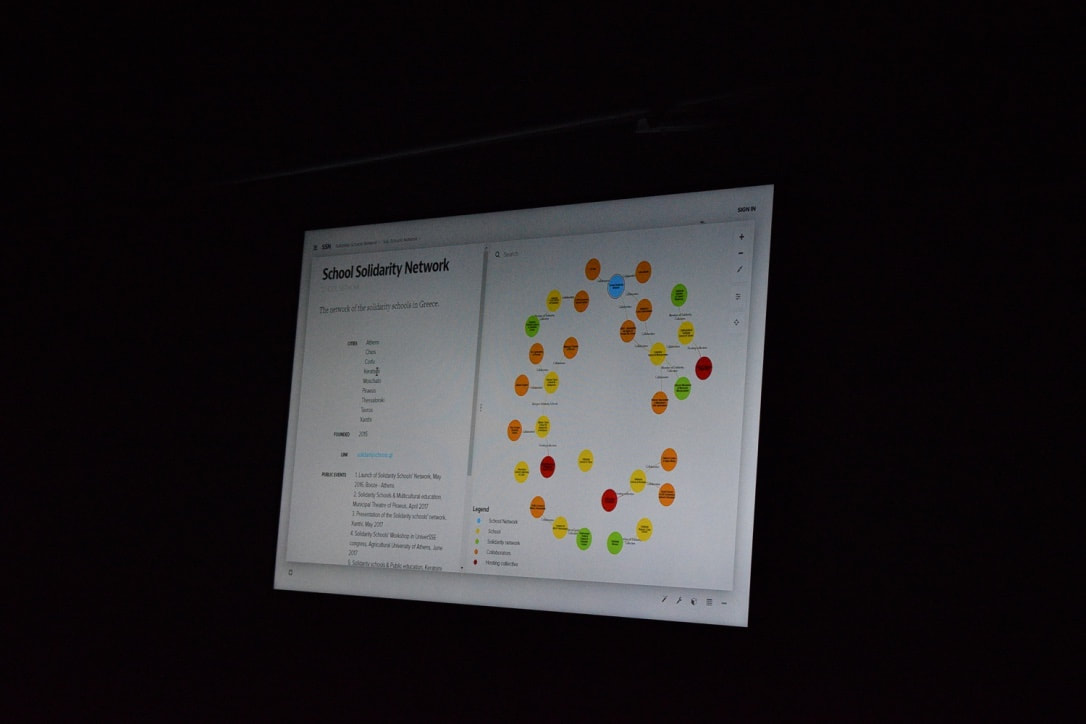|
Blog by C. Giovanopoulos
The inquiry and development of participatory forms of social infrastructure has been one of the main objectives of the infra-demos project. In this context it has embarked in a close collaboration with the Solidarity Schools Network of Greece. One of the results of this collaboration has been the development of an interactive platform which will visualize the ecosystem of the solidarity schools. This does not imply just a presentation of quantitative and qualitative information about each school. In addition, it includes the role of other actors and agents that facilitate the solidarity schools’ operation, or, whom the latter is able to mobilize. The development of the platform (still ongoing) follows a participation action research and co-design methodology. The initial discussion of the proposal for such mapping occurred in the coordinating assemblies of the solidarity schools and was followed by a first round of data collection through semi-formal interviews. During this process the issue that arose again and again was the following: what is the best way to represent the solidarity schools network according to its decentralized logic and principles? The deliberation, comments and suggestions that were made informed the platform’s final design and layout. The resulted interactive map shows thus the span of the schools social relations, mobilized resources and the reach of their transformative practices. It also provides an initial glimpse into their social infrastructural capacities. It manifests, how those transcend a net pedagogical perspective as the network expands in various scales and fields; from the local to the international and from meeting educational needs to nurturing structures and processes of education communities (and of education) as ‘expanding commons’ (Stavrides, 2017). In that respect it provides an entry, and the data, into the integrative function of the solidarity schools as participatory social(ized) and welfare infrastructure. On Saturday 16/03/2019 a ‘draft’ version of the platform was presented for first time (photos) and for deliberation to the teachers, students, parents and volunteers who participated in the assembly of the ‘Mesopotamia’ Solidarity School, in Moschato - Athens. The presentation occurred within discussions already taken place in the school about their infrastructural needs and capacities, which had also been one of the main topics of the assembly’s agenda. In addition, due to the pre-election period, candidates for the Municipality of Moschato were also present and participated in the discussion, responding to the demands expressed by members of the solidarity school. Thus, the presentation of the platform engaged in and informed also the debate and a policy making process. The assembly initiated thus a new round of co-design meetings with other members of the Solidarity Schools’ Network for feedback towards the final design of the platform. The public launch of the platform, in both Greek and English, will take place in the first public event that the Solidarity Schools’ Network organize for this year next Friday, 12 April 2019, in Thessaloniki. It forms part of the presentation of the expanded Solidarity Schools’ Network which organizes a round of public events and meetings until the end of the current academic year, starting from a two-days event in Thessaloniki on 12 & 13 of April, which will be followed by two more public events, in Corfu and Athens in June. References Stavrides St. (2016) Common Space: The City as Commons. London. Zed Books
1 Comment
|
AuthorInfra-Demos Archives
March 2023
Categories |

 RSS Feed
RSS Feed